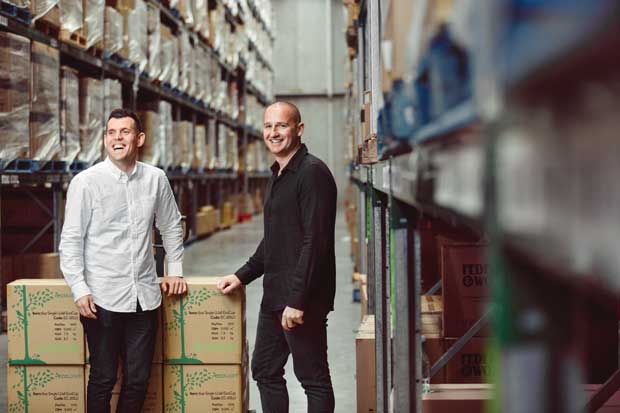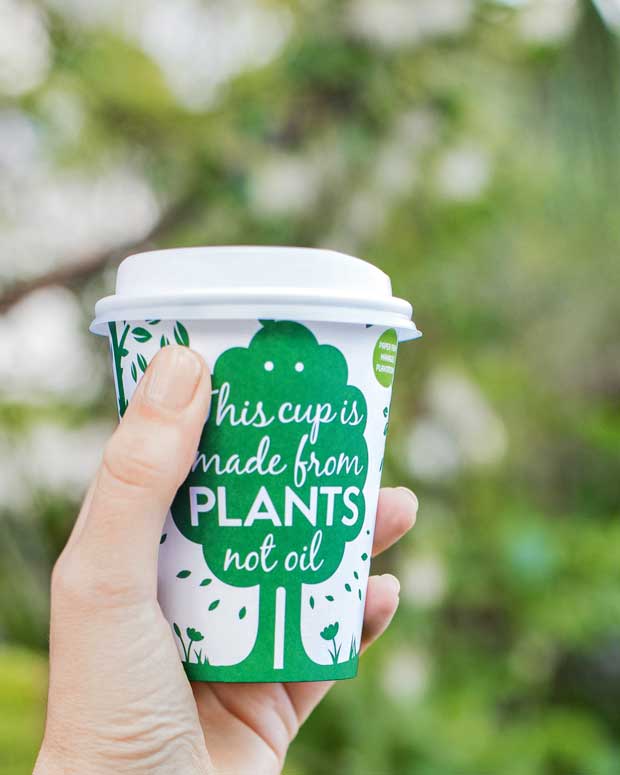Growing sustainable packaging firm Ecoware driving change

James Calver (right) and Alex Magaraggia.
A company formed by two childhood friends is helping New Zealand businesses reduce their waste.
THE NUMBERS
670% growth in the past 4 years
30 on the Deloitte Fast 50 list 2017
12 employees, six contractors
1st New Zealand packaging company to be certified carboNZero
500,000 kgs of traditional oil-based packaging replaced by Ecoware plant-based alternatives in the last 12 months
Some enterprises begin with an ‘aha’ moment but packaging firm Ecoware’s conception came after several gasps of horror. James Calver was a business student doing work experience at the Weet-Bix TRYathlon; his job was to organize the deployment of T-shirts, gold medals and a plastic cup of water to participating children. Watching the waste-management truck drive away crammed with plastic cups made his heart sink. He had a similar feeling when surfing in the Mentawai Islands, off the coast of West Sumatra. “I was in the middle of nowhere, and the amount of plastic waste that washed ashore was upsetting,” says James. Childhood friend Alex Magaraggia was on the same waste-reduction wavelength; as graduates, they teamed up to found their parent company Eightysix Trading in 2011, running things from their student-flat bedrooms. “We were eating instant noodles and working two jobs seven days a week.”
Ecoware is the second business for the pair. Their first was a venture into unbreakable glassware for the hospitality industry, but when knock-off products from overseas flooded the market, they pivoted their focus to sustainable packaging.

Bioplastic cups.
The Auckland company produces and imports environmentally conscious food packaging for the domestic hospitality and events industry, including compostable ‘bioplastic’ cups, lids and utensils, bamboo-fibre takeaway containers and coffee cups made from paperboard grown in responsibly managed plantations. It was a hard sell at first. James: “In the early days we had this bioplastic product that sounded like it was from space.”
Ecoware has had a rapid rise, making the Deloitte Fast 50 list of fast-growing New Zealand firms two years in a row. The company has won several big contracts to supply airlines, hospitals and Christchurch City Council events including the Night Noodle Markets and Lantern Festival. They export to Australia, the UK, Hong Kong and are eyeing up the US.

ELEVATOR PITCH
Ecoware design, develop and supply a range of sustainable food packaging derived from plants rather than oils and petrochemicals. Their signature bioplastic is made from cornstarch and plant starch.
TAILWINDS
Ecoware worked with Fisher & Paykel Healthcare to replace their cafeteria and water cooler packaging with sustainable products and coordinate the delivery of the packaging to a composting facility. The company now sends around 7.2 tonnes of waste to composting facilities that would have otherwise been sent to landfill. Showing other businesses the facts and figures around this case study really helped.
Headwinds
HEADWINDS
It has taken time to educate consumers about the difference between a biodegradable and compostable product. There are no parameters on the term ‘biodegradable’ – a traditional plastic bottle might biodegrade in 1000 years – whereas commercially compostable products [to Australian standard AS4736 and European standard EN 14342] must break down in 90 days with no toxic byproduct that will harm worms. Ecoware products must be compostable in a commercial composting centre. Currently 85 of the 98 composting facilities in New Zealand cannot process their products, due to their inability to sort or identify what is Ecoware and what is normal plastic.
WHAT NEXT?
To compensate for the lack of compatible commercial composters, Ecoware is developing in-house composting solutions at event venues and plan to launch a bioplastic bag with Australian-standard home composting certification.
LESSON
“Our brand is based on authenticity and we needed to be true to ourselves. We show up to business meetings in shorts and jandals which sometimes raises eyebrows, but it’s who we are, and that honesty has won us some respect.”

